2nd year subject
Acquire high skills through practical training (internship) in order to hone your basic skills and play an active role in your specialized field.
It’s a year of summarization, where you can pursue your specialty with unwavering feelings.
The second year lessons will become more specialized, with more practical training taught by front-line instructors working in the animal industry, with the aim of learning and improving skills. In addition, through an internship to experience work in the actual animal industry, it is a summary year where you can put what you have learned into practice and do job hunting.
Class outline
Increase your expertise and acquire future weapons
After learning the basics well, in order to finally become a professional, we will divide into specialized fields and give practical lessons. The advanced techniques and skills acquired here will be weapons that will fulfill your dreams for the future.
○Classes that focus on practical training and allow you to gain practice and experience
Classes will be held where you can gain practice and experience centered on practical training, which can only be acquired at a vocational school integrated with a veterinary hospital, which is rare in Japan. The advanced techniques and skills acquired here will be weapons that will make your dreams come true in the future. Not only can you practice at a school equipped with facilities for treatment and surgery, but you can also experience training and internships at a veterinary hospital. In addition, we will also conduct various learning tailored to the actual site such as training training and pet shops. We spend a lot of time practicing trimming and learn how to communicate with pet owners, which is necessary as a professional trimmer. One student is in charge of each student, and you can learn on-site techniques that will please customers from shampooing to finishing. Together with experienced instructors who are actually active in the industry, we will prepare to fly to society with the aim of coexisting with humans and animals.
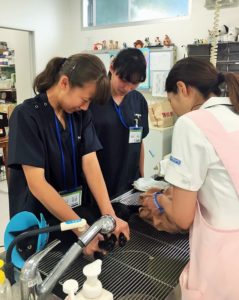
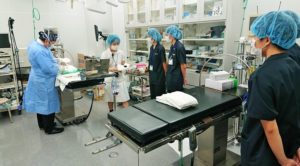
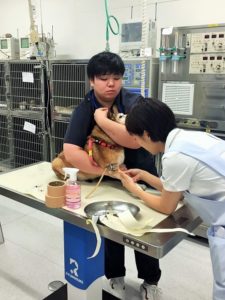
Second year curriculum
Exotic
Learn about wildlife classification and history, living organisms, characteristics, habits, breeding, breeding management, etc. of rabbits, guinea pigs, hamsters, mice, rats and birds. In addition, we will also cover various pet animals that have recently been bred in Japan, and learn about laws such as the Species Conservation Law and international cooperation.
Large animals and wild zoology
Learn about the history, breeds, characteristics, behaviors, breeding, breeding management, products and more about cattle, horses, pigs and other livestock. In addition, we will take up large and medium-sized wild animals and learn about their ecology, behavior, and other relationships with various factors from the environment, as well as breeding and exhibition methods and ecology observation methods.
Business manner
We aim to develop personality by learning the elements of personality such as language, speaking style, attitude, and behavior, deepening the understanding of common sense necessary as a member of society.
Employment support
As a job hunting course, you will receive a resume writing method, interview method, make-up course, etc. In addition, you will learn the behavior during internship and job hunting, which is the core of job hunting, and the behavior after job hunting.
Integrated clinical training
Understand the veterinary medical work performed in the veterinary hospital, and experience and deepen the understanding of each in the field. You will also learn how to communicate, report, contact and consult in the workplace.
Client Education Studies
Learn how to instruct owners on various disease prevention, contraceptive castration, health management, hygiene management guidance, etc.
Training
Based on the knowledge learned in training, you will learn how to train animals and make plans. In addition, you will deepen your understanding by experiencing the differences in correspondence depending on the animal breed.
Practical training at zoos, etc.
It is a class to actually go to the site of the zoo and the protection center and gain practical experience.
Public health
Learn about the relationship between public health and veterinary medicine, the relationship between public health and illness, the relationship between public health and the environment, major zonosis, nosocomial infection protection, sterilization methods, characteristics of disinfectants, infectious diseases and their countermeasures.
Pathology
Mainly learn about the introduction of pathology about pathology, and learn in detail about the mechanism of disease onset, deformation, metaplasia, atrophy, hypertrophy, hyperplasia, edema, inflammation, and swelling.
Related laws and regulations
Veterinary Law on Veterinary Medicine, Veterinary Disease Prevention Law, Act on Welfare and Management of Animals, Bird and Beast Protection Law
Parasitology
Learn about ectoparasites and endoparasites. We will learn about the nature and extermination of parasites that parasitize each part of major animals, and there are two types of endoparasites, intestinal parasites and intravascular parasites.
Young and old animal nursing
Breastfeeding methods and excretion assistance for young and old animals. Learn about home / visit management, aging physical characteristics, dementia disorders, pressure ulcer prevention, bleeding improvement, and night squeal improvement.
Hospitalization management
Mainly learn about care at the time of admission, nursing care plan, nursing record, and nursing by treatment / treatment. Learn about bed management, observation, excretion, diet, mental care, assessment, pain management, ICU, and infectious diseases.
Internal medicine
Learn daily medical work. You will deepen your understanding by learning about interviews, physical examinations, other changes in organs and organs, care for sick animals, and administration of medicines. You will also learn about the causes, symptoms, treatments, and treatments for diseases that often occur.
Pharmacology
Understand the basic handling of drugs and learn about typical ones such as autonomic nervous system drugs, central nervous system, antibiotics, antifungal drugs, parasite repellents, and hormones. We will take up the medicines that are often handled in the hospital and deepen the understanding of pharmacology.
Clinical laboratory training II
You will mainly learn about sample processing, handling of sample equipment, blood test, urinalysis, stool test, cytology, and microbiological test in clinical laboratory. You will also learn more about immunological tests, microscopic tests, specimen preparation, differences between normal and abnormal, crossmatching, and culture.
Trimming training
In the trimming major course, you will understand the technique of emphasizing the characteristics of each breed and acquire practical skills through practical training. Learn to maximize the charm of animals.
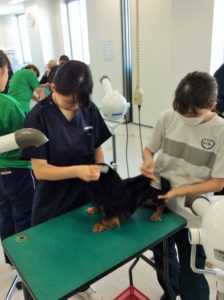

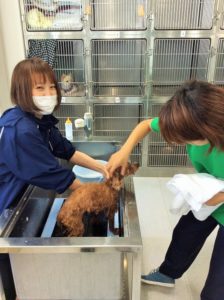
Training
Through practical training, we will practice animal discipline or training based on the knowledge learned in training. You will learn that the correspondence differs depending on the animal breed.
Surgical Nursing II
You will mainly learn about surgical nursing related work, preoperative and postoperative nursing, anesthesia / analgesia, and anesthesia monitoring. Surgical preparation, wearing surgical glove / gloves, thread type, instrument type and purpose, surgical assistant, pretreatment, surgical field preparation, surgical wound protection, rehabilitation station, pain management, anesthetic, analgesic preparation, animal Learn more about nursing, equipment handling equipment, and evaluation.
